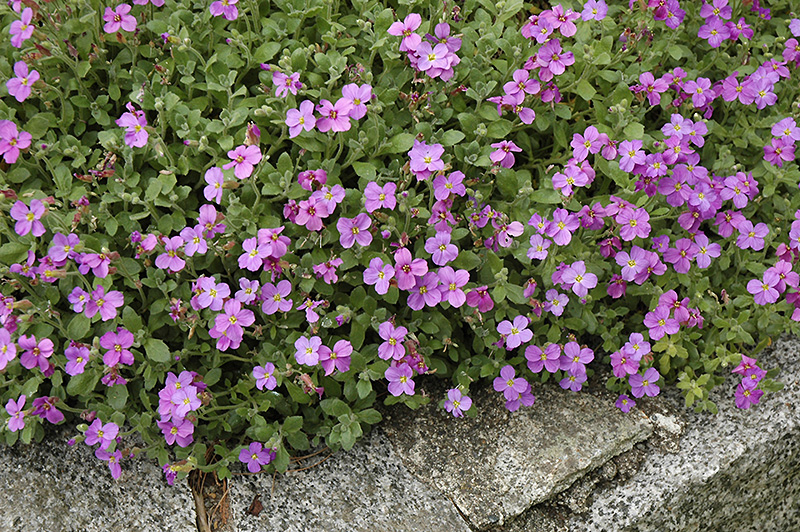Height: 12 inches
Spread: 18 inches
Sunlight:
![]()
![]()
Hardiness Zone: 4a
Other Names: Lilacbush, Rainbow Rock Cress
Description:
This variety is ideally suited to the rock garden; profuse flowers in shades of purple cover this robust grower in spring; prune to encourage re-blooming; perfect as an edging or spilling over a wall
Ornamental Features
Purple Rock Cress is smothered in stunning purple cup-shaped flowers at the ends of the stems from mid to late spring. Its small tomentose round leaves remain grayish green in colour throughout the year.
Landscape Attributes
Purple Rock Cress is a dense herbaceous evergreen perennial with a ground-hugging habit of growth. Its relatively fine texture sets it apart from other garden plants with less refined foliage.
This is a relatively low maintenance plant, and should only be pruned after flowering to avoid removing any of the current season's flowers. It is a good choice for attracting butterflies to your yard. It has no significant negative characteristics.
Purple Rock Cress is recommended for the following landscape applications;
- Rock/Alpine Gardens
- Border Edging
- Groundcover
- Container Planting
Planting & Growing
Purple Rock Cress will grow to be about 12 inches tall at maturity, with a spread of 18 inches. Its foliage tends to remain dense right to the ground, not requiring facer plants in front. It grows at a slow rate, and under ideal conditions can be expected to live for approximately 10 years. As an evegreen perennial, this plant will typically keep its form and foliage year-round.
This plant does best in full sun to partial shade. It prefers to grow in average to moist conditions, and shouldn't be allowed to dry out. It is not particular as to soil type, but has a definite preference for alkaline soils. It is somewhat tolerant of urban pollution. Consider applying a thick mulch around the root zone over the growing season to conserve soil moisture. This species is not originally from North America. It can be propagated by division.
Purple Rock Cress is a fine choice for the garden, but it is also a good selection for planting in outdoor pots and containers. Because of its spreading habit of growth, it is ideally suited for use as a 'spiller' in the 'spiller-thriller-filler' container combination; plant it near the edges where it can spill gracefully over the pot. Note that when growing plants in outdoor containers and baskets, they may require more frequent waterings than they would in the yard or garden. Be aware that in our climate, most plants cannot be expected to survive the winter if left in containers outdoors, and this plant is no exception. Contact our experts for more information on how to protect it over the winter months.



